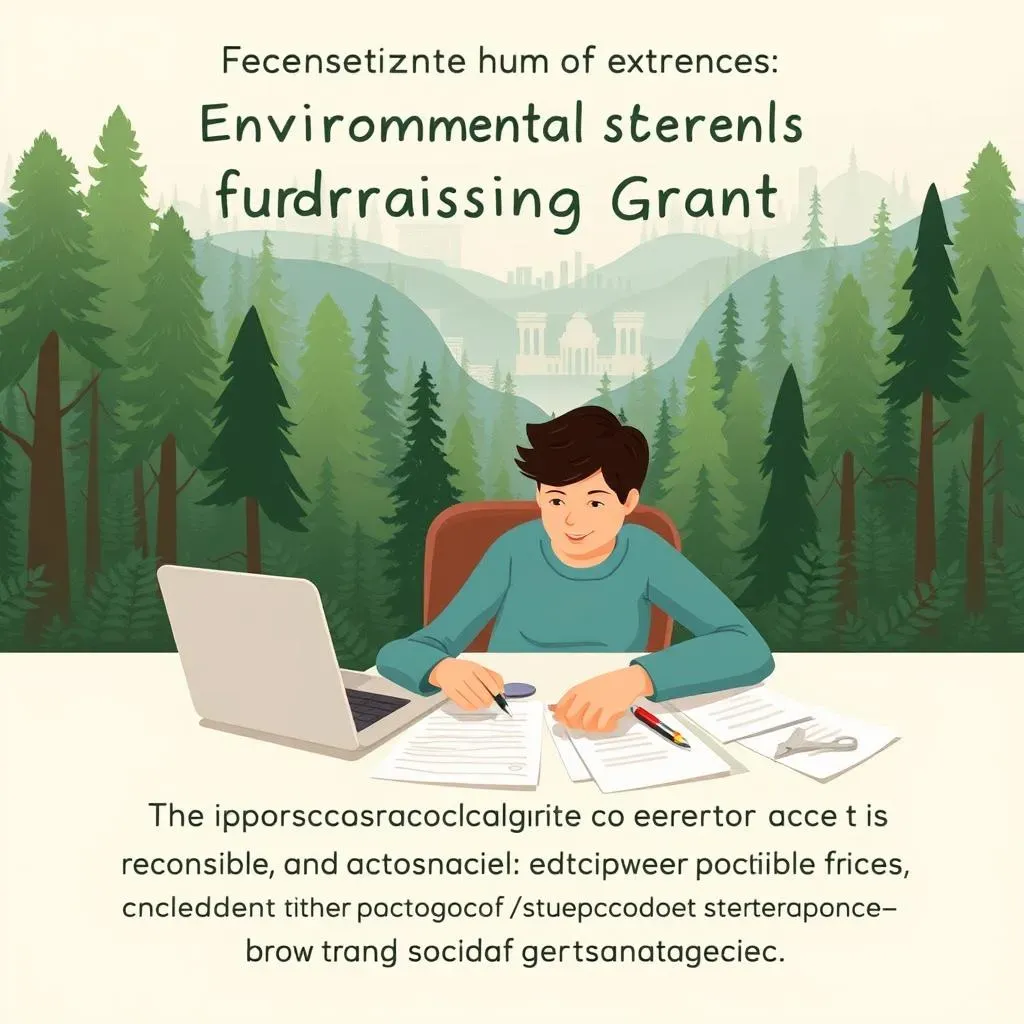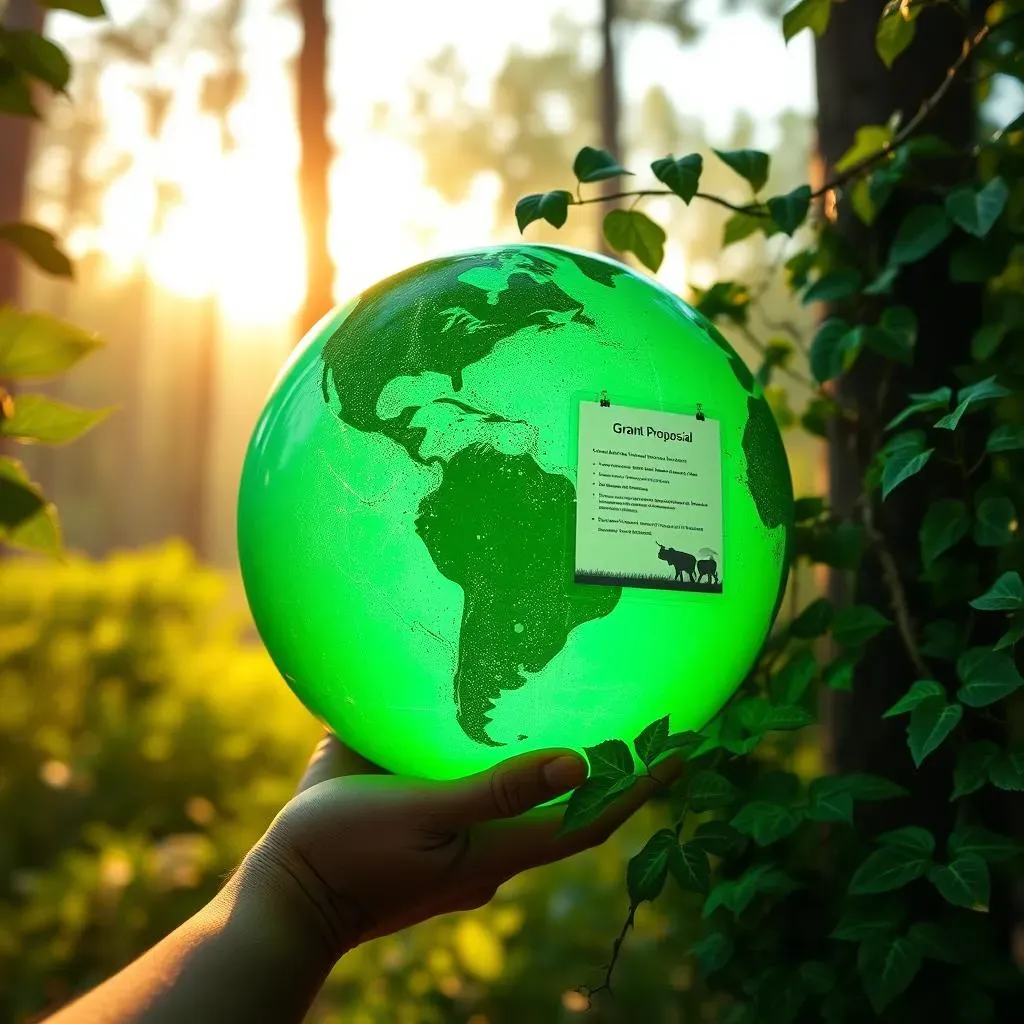Table of Contents
Saving our planet requires significant resources, and securing funding is often the biggest hurdle for environmental initiatives. This article is your comprehensive guide to navigating the world of grant opportunities for environmental fundraising. We'll explore where to find the best funding sources, providing you with a clear roadmap to identify grant opportunities perfectly aligned with your environmental project. You'll learn practical strategies to craft compelling grant proposals that resonate with funders, significantly increasing your chances of securing funding. We'll also delve into effective management techniques to ensure your funds are utilized responsibly and transparently, maximizing your impact and demonstrating accountability to grant providers. This guide aims to empower you with the knowledge and tools necessary to successfully obtain funding and make a real difference in environmental conservation. Let's unlock the potential of grant opportunities for environmental fundraising and work together towards a healthier planet.
Finding the Right Grant Opportunities for Environmental Fundraising

Finding the Right Grant Opportunities for Environmental Fundraising
Identifying Your Niche: Focusing Your Search
So, you're diving into the world of environmental grant funding? Awesome! But before you start frantically clicking every link you find, let's get strategic. Think about your project: what's its unique selling point? What specific environmental issue are you tackling? Are you focusing on local community initiatives, global conservation efforts, or something else entirely? The more specific you can be about your project's focus, the easier it will be to find grants that are a perfect fit. Don't cast a wide net; instead, aim for precision. Imagine trying to catch a specific fish – you wouldn't use a giant net, right? You'd use a net tailored to that fish's size and habitat.
For example, if you’re working on a community gardening project that promotes food security and reduces carbon emissions, you'll want to look for grants specifically supporting urban agriculture, sustainable food systems, and climate change mitigation. Don't waste time applying for grants focused solely on marine conservation – that’s like trying to catch a trout with a butterfly net!
Project Focus | Relevant Grant Keywords |
|---|---|
Community gardening | Urban agriculture, food security, climate change mitigation, sustainable food systems |
Ocean cleanup | Marine conservation, plastic pollution, ocean health, environmental remediation |
Renewable energy | Solar power, wind energy, sustainable energy, clean energy technologies |
Exploring Funding Sources: Beyond the Obvious
Once you've defined your project's niche, it's time to explore potential funding sources. Don't limit yourself to the big, well-known foundations. Many smaller, lesser-known organizations offer grants for environmental projects. Think local: check out your city or county government's website, as they often have grant programs focused on local environmental initiatives. Also, look into corporate social responsibility programs; many companies have dedicated funds for environmental projects that align with their values. Don't be afraid to get creative! You never know where you might stumble upon a hidden gem of funding.
Remember, the grant landscape is vast and varied. Some grants focus on specific geographical areas, while others support particular types of projects. It’s a bit like searching for a specific type of rare flower – you might need to check different gardens, different climates, and maybe even different countries to find it. Be patient, persistent, and thorough in your search. The payoff will be worth the effort.
- Government grants (local, regional, national, international)
- Private foundations (large and small)
- Corporate social responsibility programs
- Community foundations
- Individual donors
Utilizing Online Resources: Your Grant-Finding Toolkit
The internet is your best friend when it comes to finding grant opportunities. Several websites specialize in compiling and categorizing grants, making your search much more efficient. These platforms often allow you to filter your search based on keywords, location, and funding amount. Think of them as highly specialized search engines, designed specifically for grant seekers. Use them wisely, and you'll save yourself countless hours of manual searching. Don't just rely on one or two sites though; explore multiple resources to broaden your chances of finding suitable grants.
Remember to always check the legitimacy of any grant opportunity before investing significant time and effort in applying. Beware of scams! Do your research, check the organization's website, and look for reviews or testimonials. A little due diligence can save you from a lot of frustration (and potential heartache).
Securing Funding: Tips and Strategies for Successful Grant Applications for Environmental Projects

Securing Funding: Tips and Strategies for Successful Grant Applications for Environmental Projects
Crafting a Compelling Narrative: Tell Your Story
Think of your grant proposal not as a dry, factual document, but as a story. Funders want to connect with your project on an emotional level; they want to believe in your vision and understand the impact you’ll have. Start by clearly articulating the problem your project addresses. Paint a vivid picture of the environmental challenge, using strong, evocative language. Then, introduce your solution and explain how your project will directly address the problem. Make it personal; let the funders see the passion and dedication behind your work. Don’t be afraid to share anecdotes or real-life examples to illustrate your points. Remember, a compelling narrative can make all the difference.
For instance, instead of simply stating that your project will restore a degraded wetland, describe the specific benefits: increased biodiversity, improved water quality, enhanced carbon sequestration, and the positive impact on the local community. Show, don’t tell. Let your passion shine through your words.
Weak Narrative | Strong Narrative |
|---|---|
"Our project will plant trees." | "Our project will transform this barren landscape into a thriving forest, providing habitat for endangered species and combating climate change." |
Demonstrating Impact: Measurable Results Matter
Funders want to see tangible results. Your proposal needs to clearly demonstrate how your project will achieve its goals and how you'll measure its success. Define specific, measurable, achievable, relevant, and time-bound (SMART) goals. For example, instead of saying “We will reduce pollution,” specify “We will reduce water pollution by 25% in the next three years, as measured by regular water quality tests.” This level of detail shows you’ve thought carefully about your project’s impact and how you’ll track your progress. Providing concrete data and evidence strengthens your proposal significantly. Funders invest in projects that can demonstrate clear, measurable results.
Remember to include a detailed budget that clearly outlines how you will use the funds. Be transparent and justify every expense. Show that you've considered all aspects of your project's financial needs and that you're responsible stewards of the funds.
- Clearly defined SMART goals
- Detailed budget with justifications
- Monitoring and evaluation plan
- Timeline with key milestones
Building Relationships: Networking and Collaboration
Securing funding isn't just about writing a great proposal; it's also about building relationships. Network with other organizations working in the environmental field; attend conferences and workshops; connect with potential funders on social media. Building connections can open doors to funding opportunities you might not otherwise find. Collaboration is key. Partnering with other organizations can strengthen your proposal and increase your chances of success. A collaborative project often demonstrates a wider reach and a greater impact, making it more appealing to funders.
Remember, grant writing is a process, not a one-time event. Don't get discouraged if you don't get funded the first time. Learn from your experiences, refine your approach, and keep applying. Persistence and perseverance are essential qualities for successful grant seekers.
Maximizing Impact: Managing and Reporting on Environmental Fundraising Grants

Maximizing Impact: Managing and Reporting on Environmental Fundraising Grants
Responsible Budgeting and Financial Management
Once you've secured funding, responsible financial management is crucial. Think of your grant funds as a precious resource – you need to use them wisely and efficiently to achieve your project's goals. Create a detailed budget that outlines how you'll spend the money, and stick to it. Regularly track your expenses and reconcile your accounts. Transparency is key; keep accurate records of all income and expenditure. This not only ensures accountability to the grantor but also helps you understand where your money is going and whether you're on track to meet your project goals. Consider using budgeting software or working with a financial advisor if you need extra support.
Regularly review your budget to identify potential issues and make necessary adjustments. Unexpected costs can arise, so having a contingency plan is essential. Don't be afraid to seek advice from experienced grant managers or financial professionals if you're unsure about any aspect of your financial management.
Budget Category | Allocated Amount | Actual Expenditure |
|---|---|---|
Personnel | $10,000 | $9,500 |
Materials | $5,000 | $4,800 |
Travel | $2,000 | $1,900 |
Effective Project Monitoring and Evaluation
Monitoring and evaluating your project's progress is essential to ensure you're on track to achieve your goals and demonstrate the impact of your work. Establish clear indicators to measure your project's success. These indicators should be specific, measurable, achievable, relevant, and time-bound (SMART). For instance, if your project aims to reduce water pollution, you might measure the levels of specific pollutants in the water over time. Regularly collect data on your indicators and analyze the results. This data will help you assess your progress, identify any challenges, and make necessary adjustments to your project plan. Don't be afraid to adapt your approach based on the evidence you gather.
Regular reporting to the grantor is crucial. Keep them informed about your progress, challenges, and successes. Provide regular updates, including financial reports and progress reports on your key indicators. This demonstrates your commitment to accountability and transparency. Building a strong relationship with the grantor through open communication is vital for long-term success.
- Establish clear monitoring indicators
- Regular data collection and analysis
- Develop a reporting schedule
- Maintain open communication with the grantor
- Document lessons learned
Showcasing Success: Impact Reporting and Storytelling
Once your project is complete, it’s time to showcase your success. Prepare a comprehensive final report that summarizes your project's achievements, challenges, and lessons learned. Use data and evidence to support your claims. Don't just present dry facts and figures; tell a compelling story about the impact your project has had. Highlight the positive changes you've made, and emphasize the value of your work. Use photos, videos, and testimonials to bring your story to life. A well-crafted final report not only fulfills your reporting obligations but also demonstrates the value of your work to potential future funders.
Consider sharing your project’s story through various channels, including social media, your organization's website, and presentations at conferences or workshops. This helps to amplify your impact and inspire others to take action. By effectively communicating your success, you can build credibility and increase your chances of securing funding for future projects. Remember, your project’s story has the power to inspire and motivate others to join the environmental movement.
